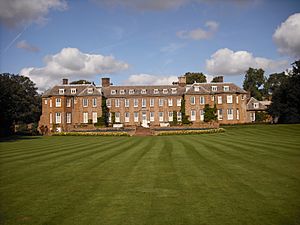Rushout Cullen facts for kids
Sir Rushout Cullen (born 1661, died 1730) was an important English landowner and politician. He held the title of the 3rd Baronet of his family. He lived in places like Upton in Warwickshire and Isleham in Cambridgeshire. Sir Rushout was a member of the Whig Party, which was one of the main political groups in England at the time. He served in the English and later the British House of Commons (which is like today's Parliament) from 1697 to 1710.
Early Life and Family
Sir Rushout Cullen was born in 1661. His father was Sir Abraham Cullen, 1st Baronet, who was also a Member of Parliament (MP). His mother was Abigail Rushout.
In 1677, when he was about 16 years old, Sir Rushout inherited the title of Baronet from his older brother, John. A Baronet is a special title given by the King or Queen, which is passed down through the family.
Sir Rushout married his cousin, Mary Adams, in 1686. Sadly, Mary passed away around 1694. She had inherited some land in Cambridgeshire. After her death, Sir Rushout married his second wife, Eleanor Jarrett, in 1696.
Sir Rushout was very involved in managing his family's land. In 1688, he sold some property in East Sheen and bought more land at Upton for a large sum of money. Around 1695, he built a beautiful house on his Upton estate, which is now known as Upton House.
Political Career
Sir Rushout Cullen was a dedicated politician who belonged to the Whig Party. The Whigs generally supported a stronger Parliament and less power for the King.
He first tried to become a Member of Parliament (MP) for Cambridgeshire in 1693, but he lost by a small number of votes. He tried again in 1695 for Evesham but was not successful.
Finally, in 1697, Sir Rushout was elected as an MP for Cambridgeshire. This meant he had a seat in the House of Commons, where laws were made. He was re-elected several times without facing opposition in 1701 and 1702.
As an MP, Sir Rushout often supported the Whig government's plans. For example, in 1709, he voted to allow people from a region called Palatine (in Germany) to become British citizens. In 1710, he also voted in favor of impeaching (putting on trial) a man named Dr. Sacheverell, which was a big political event at the time.
Sir Rushout decided not to run for re-election in 1710. He then retired from politics and spent his time on his estates in Warwickshire.
Later Life and Legacy
Sir Rushout Cullen passed away on October 15, 1730, and was buried at Upton.
He had one daughter, Mary, who married Sir John Dutton, 2nd Baronet. However, Sir Rushout did not have any sons. Because of this, when he died, the title of Baronet in his family ended. His nephew, Thomas Bedford, inherited his property.
 | Tommie Smith |
 | Simone Manuel |
 | Shani Davis |
 | Simone Biles |
 | Alice Coachman |


